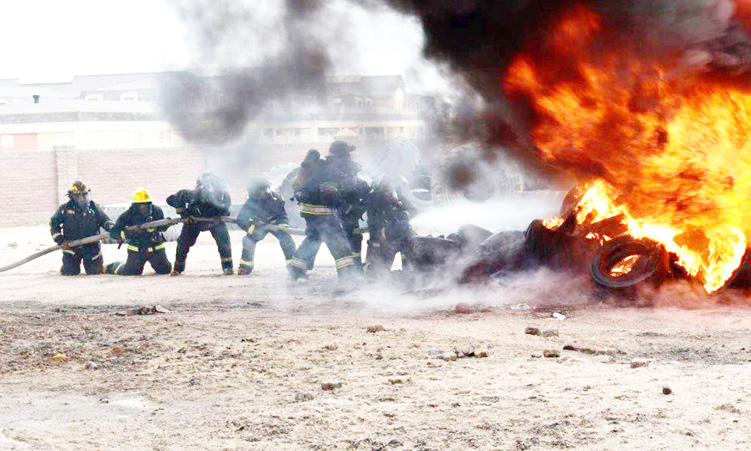A lack of coordination and synergy is the biggest challenge faced by Namibian fire brigades, says a senior firefighter.
Windhoek Fire Brigade senior station officer Philippus Shikongo yesterday spoke to Desert Radio on the occasion of International Fire Safety Week.
Since fire brigades are governed by local authorities, there are considerable differences in how the brigades are equipped, said Shikongo. He called for the establishment of “a national fire brigade service, not necessarily in terms of firefighting, but in terms of fire safety and prevention.”
Shikongo also expressed frustration with the limited understanding of public health.
“People stop at public health and forget about the safety element. Public health should actually be public health and safety,” he said.
This broader definition includes fire prevention or fire evacuation plans, as awareness of these issues lacks in many communities.
The senior firefighter further explained how fire brigades try to address these challenges by focusing on education, engineering aspects, enforcement and emergency response.
Through education, the firefighters aim to raise basic awareness about fire hazards as well as safety tips. Looking at engineering factors, fire brigades aim to identify significant risks.
“If you look at the informal settlements that we have in Namibia, the materials they use [for housing], such as cardboard, are extremely flammable,” said Shikongo, adding that the crowdedness of such settlements is a serious fire hazard.
For Shikongo, enforcement presents a major problem as well.
While fire inspectors dutifully carry out inspections in Windhoek, many local authorities elsewhere don’t have the luxury of specific experts carrying out enforcement.
He points out: “The inspectors that go out are building inspectors. They are not experts when it comes to fire safety or fire engineering.”
Finally, in terms of emergency response, Shikongo said communities must notify their fire brigades as soon as possible.
Here, education about fire safety plays a major role.
If notified too late, Shikongo said, they can only engage in defensive firefighting, meaning they are only preventing the flames from spreading further, rather than actively trying to extinguish them and save a burning structure.
Shikongo commended the country’s fire brigades for their educational outreach, while stressing that much work remains to be done.
“We invited different local authorities so that we can see, come next year around the same time, what are we doing as a nation, rather than as the City of Windhoek,” the firefighter said.
He also spoke about the mental health impact of his job, pointing out that firefighters are often confronted with extreme and sometimes traumatic situations.
According to Shikongo, the mental burden is particularly heavy on retired firefighters.
“All the things that you used to see, all the things that you used to suppress, come back and this is where you suffer.”
In active service, most firefighters stay busy and do not have the time to process the stress.
“We always advise the juniors or the active firefighters to keep away from quick fixes . . . and understand that you win some, you lose some,” he said.
His advice to young firemen is: “If you know you have trained, trained, trained, never be too particular with what mistakes you may have made.”
Stay informed with The Namibian – your source for credible journalism. Get in-depth reporting and opinions for
only N$85 a month. Invest in journalism, invest in democracy –
Subscribe Now!







